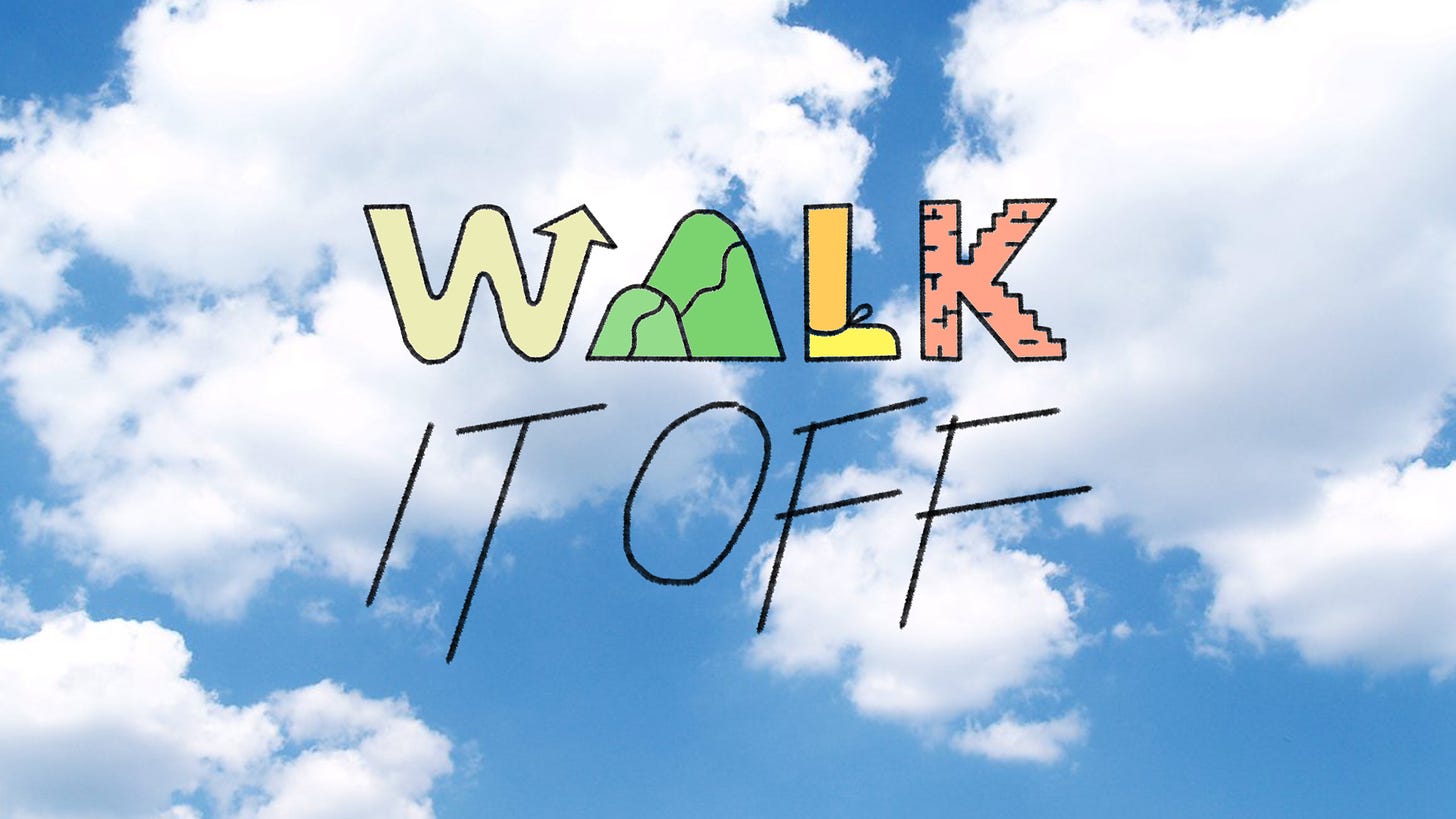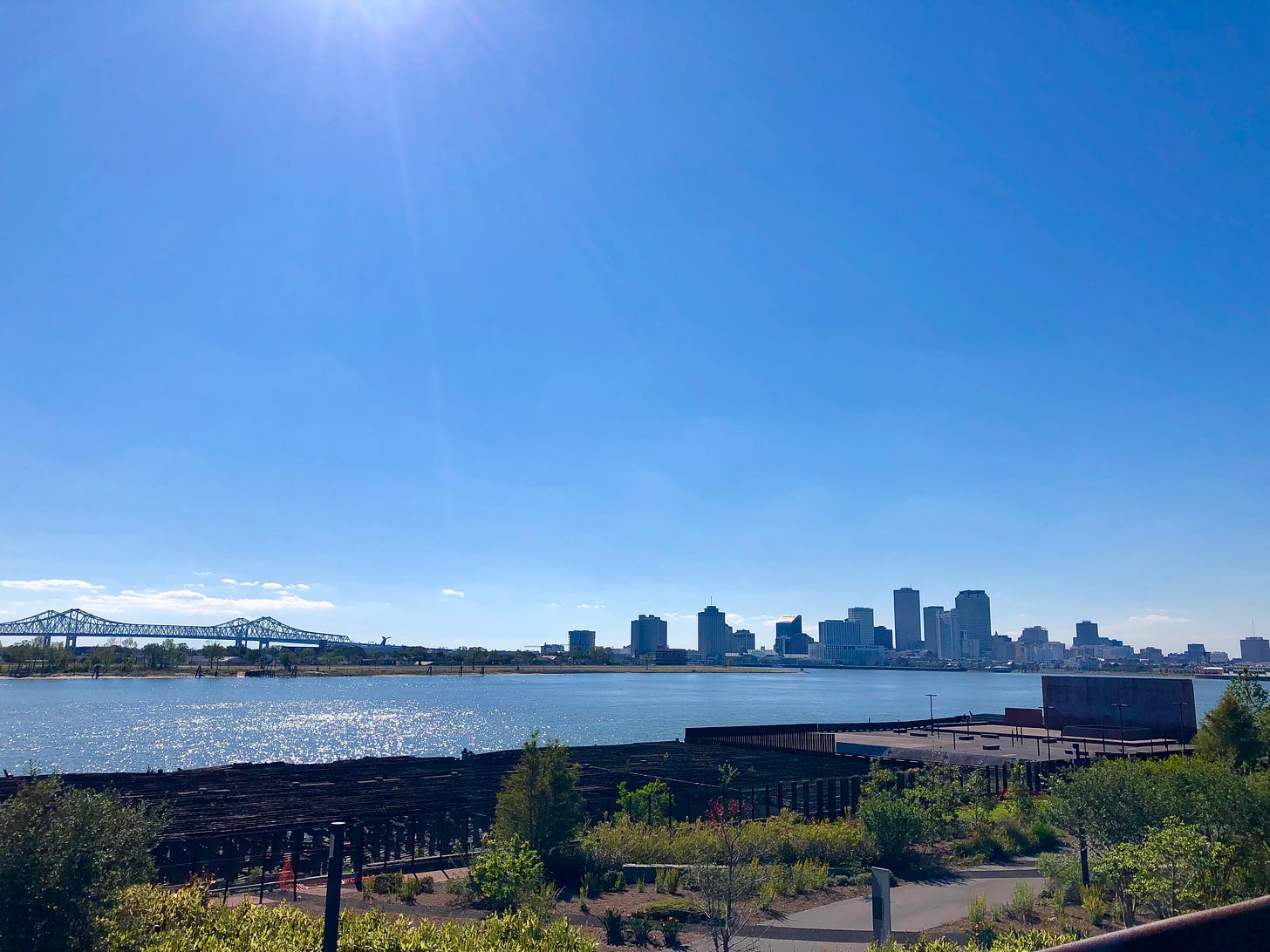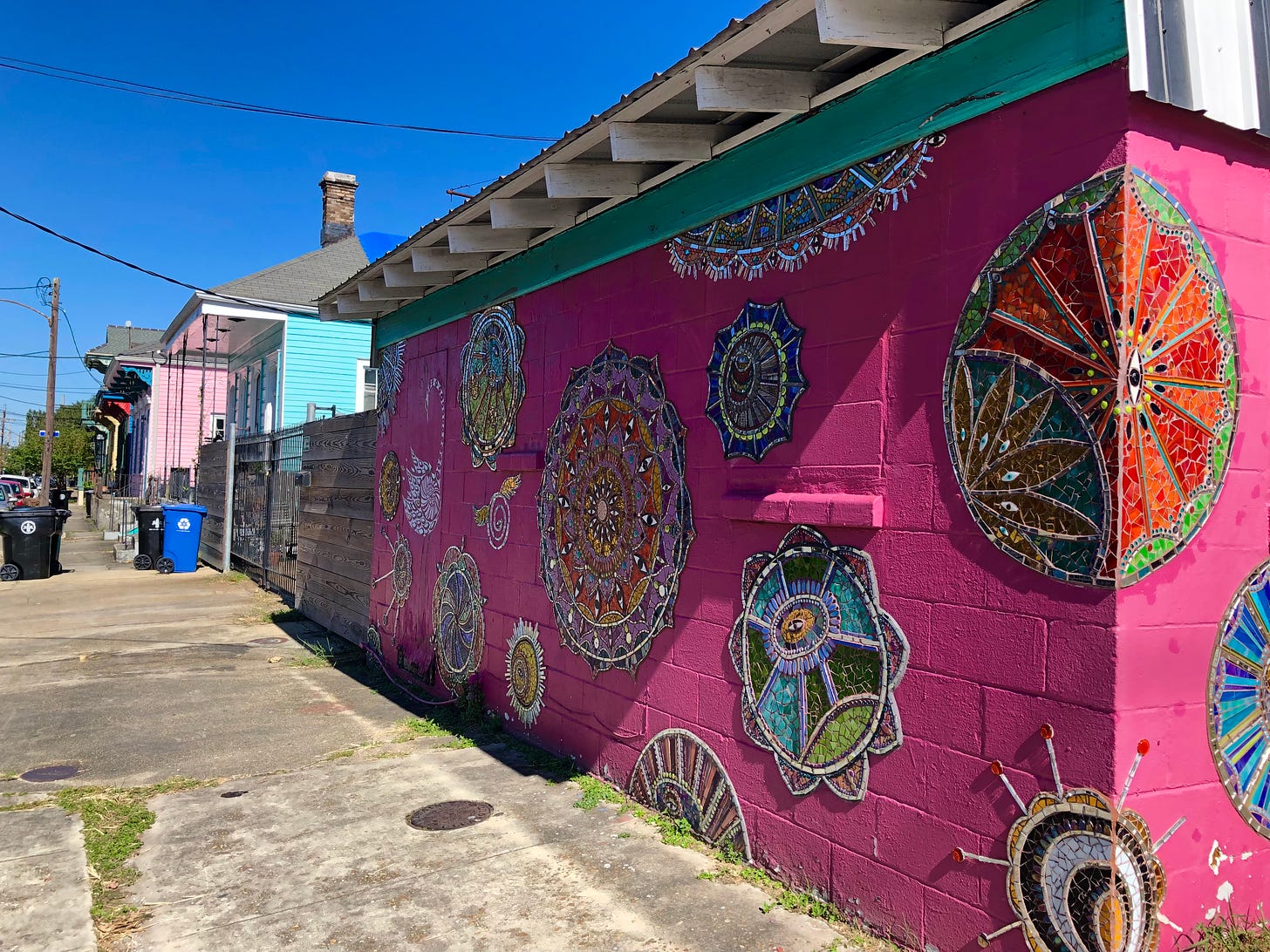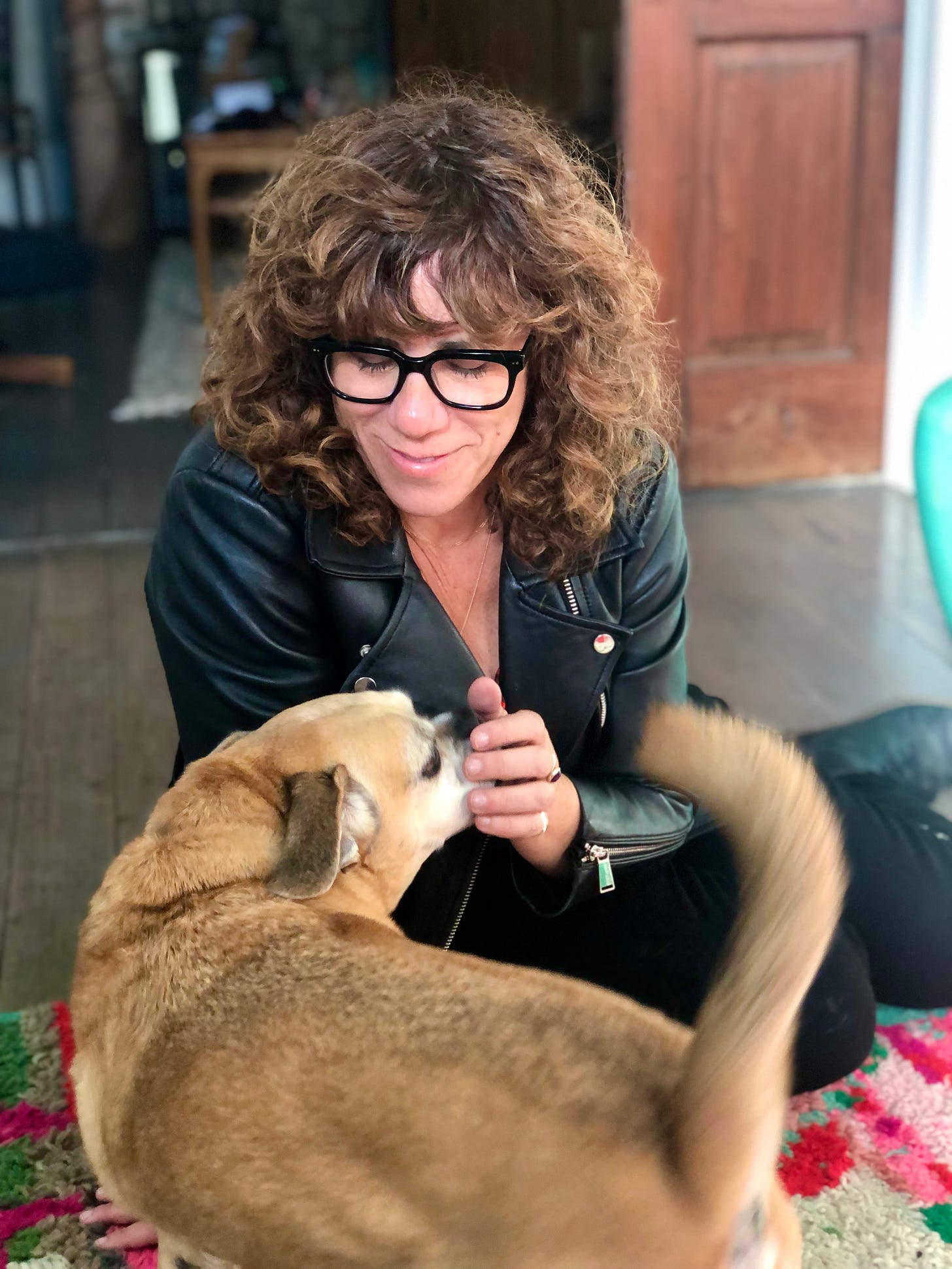“Today’s your birthday!”
“Today is my birthday.”
It’s November 1st, 2021 and Jami Attenberg and I are walking over the large footbridge in Crescent Park. Below us are train tracks, and in front of us the Mississippi River sparkles in the sunlight while the buildings of downtown New Orleans cut into the bright, blue sky.
I—along with many other friends from around the country—am in town for Jami’s 50th birthday. The entire weekend has been bursting with laughter, food, music, and revelry. Today is her actual birthday, though. It’s a Monday, and the celebrations have left Jami and I pleasantly worn out. We walk a little slowly, speak a little softly, but the warmth of the past few days rests in the smiles on our faces.
Our stroll will take us through the Bywater. We will stop to split a po' boy at Frady’s One Stop Food Store, and then fight against our champagne hangovers with an afternoon drink at Bud Rip’s Old 9th Ward Bar. Eventually we will make our way back to Jami’s house, where we will be greeted by her beloved dog, Sid.
But first I notice that “Happy Birthday” has been scratched into a metal wall in the park, so I ask Jami to stop and pose for a picture.
Isaac: You’ve written seven novels, but your latest book—I Came All This Way to Meet You—is a memoir. Why a memoir? Why now?
Jami Attenberg: Definitely part of it—for me—was about turning 50. Feeling that I had enough distance from certain periods in my life to actually write about them in an honest and true way. Feeling that I had something to say about those periods of time, and that there was something worth uncovering during the process of writing about them. Putting together all the pieces of my life and seeing what the through lines were—exactly as I would do when writing a novel.
A memoir finally felt like an interesting project to me. It had never felt like an interesting project before. I sold the book before the pandemic, so it wasn't pandemic related. I'd been mulling over the idea for a long time. Thinking about whether I really wanted to do a memoir for at least a year before I even sold it.
I: Were you surprised by any of the through lines that you discovered during the writing process?
JA: I was surprised to find that… I'm happy? Which is to say I’m surprised that the memoir landed in a good place. I didn't know how the book was going to end. But I had an idea, and that idea—to be honest—was a little dark. That’s what I had in mind. But as I went through the revision process the book ended up in a bit of a happier place because, well, I am currently pretty happy. As happy as one can be in this miserable, difficult world of ours.
I: You mentioned the through lines, but in general did you find writing memoir somewhat similar—or wildly different—to writing fiction? What was your process?
JA: The first thing my editor told me to do was write everything down. “Go long,” she said. “Say as much as you're willing to say, and then we'll carve out a story from that. We'll see what's interesting about it.” Because sometimes it's hard to figure out what's interesting about your own life. Or, quite often, what’s interesting to you isn’t interesting to anybody else.
We also wanted to make sure that the book wasn’t too inside baseball. So that was a big part of the process—figuring out what would be accessible to anyone who's reading it. You don't have to be a writer to read this book. Our hope is that it’s a book for people who are creatively minded, or interested in people who are creatively minded.
So I wrote it all down. The original draft was 92,000 words. Now it's 72,000 words. Which is to say that there's one draft with all my secrets. Only one person besides my editor has read it.
I: The scandalous director's cut.
JA: The person who has read the full draft still likes me as a human being, which is nice. But yeah, first I had to write down the entirety of the truth and then I had to figure out a way to carve that truth into an interesting story. The book jumps around in time, but that’s kind of the way life works. Moments happen, and they become these little time bombs simply waiting to go off 20 years later.
I: Did you find yourself discovering memories that were difficult to revisit?
JA: Not to give too much away—although if you read any review, it's probably going to talk about it—the chapter about my assault was the starting point for the entire book. I’d been writing that chapter for four years. Maybe longer. I kept going at it and going at it. It took me a long time to find the right framework for it. I needed to live more life, if that makes sense. When I did finally finish it, I was glad I took the time to get it right. Even if it was incredibly difficult to write.
That was the hardest chapter for me in terms of writing about my past. In a way, it’s a very simple story. Because it’s a very common story. Far too common. But it was also the story that I had to write the entire rest of the memoir around. So it was with me constantly. I was in therapy the whole time I was writing the rest of the book.
Then the pandemic happened. I'd already sold the book and knew I was going to be writing it—saying to myself, “This is what I'm doing next year.” So the pandemic gets written into the book a little bit and being in therapy gets written into the book a little bit.
I: Did therapy help you with the pandemic?
JA: Yes.
I: Full stop?
JA: Full stop.
I: Your last book, All This Could Be Yours, came out in the fall of 2019. You got to go on book tour and then, a few months later, everything shuts down. In general, I think of you as someone who travels quite a bit. Was it hard being, I don’t know, grounded?
JA: Did it suck? Of course it sucked. But I'm happy to be alive. No complaints allowed. That's basically it.
I: Your philosophy is, “I’ll take it.”
JA: I missed travel. I missed it, but I didn't die. It’s been so hard for my friends who are teachers, or service industry workers, or medical workers. For my friends who have children. My friends who lost family members. So, like I said, no complaints.
I did have to grapple with my identity a bit. If you're somebody who travels for work and suddenly you can’t travel for work? It takes you out of your pattern. The system that you’re used to. Travel is very good for avoiding your shit, you know? So I suddenly had to deal with figuring out who I was. Thinking, “What if it's this way forever?” It opened up some time for self-evaluation. In almost every way 2020 was a terrible year, but it was a good year for having to sit with yourself and that was very good for writing a memoir.
I: For taking stock.
JA: Taking stock of everything.
I: How long have you been in New Orleans now?
JA: I bought my house six years ago in February. But I’ve been coming here for long stretches of time since 2012.
I: So a decade long relationship at this point. What do you love about New Orleans?
JA: I love the people and the street life and the friendliness and the beauty of the city. I love the community and the food and the nightlife. These things are all obvious, but also they are all true.
I: When you started coming to New Orleans a decade ago, what first drew you to the city?
JA: One thing—out of many—that I loved was that nobody gave a shit about what you do or who you are at all. At the time I was coming from New York City, where everyone asks you what you do. Now, people in New York are wonderful. It feels familiar and natural for New Yorkers to ask that question. It’s an opening. A conversation starter. I get it. But at that time in my life? I simply wasn’t interested in answering that question.
I: You were still figuring it out.
JA: I was—and I wasn’t happy with where I was in my life. I’d been dropped by my publisher. I was really broke. It was ten years ago. I was 40. It was a period of reconfiguration for me, and here was this city where I could take the time to figure out who I was—who I was growing into—and nobody would bother me about it. Nobody would even bother to be interested in that question: “What do you do?”
But I love the city for all those other reasons too. To me, New Orleans is just as interesting as New York.
I: That's beautiful.
JA: It’s also infinitely more livable. I remember being in New York when I was 40 and thinking, “Where do I want to be when I’m 50?” And the answer was, “Not here.” I had started visiting New Orleans for a couple years in a row at that point. I realized, “Here. New Orleans is where I want to be when I turn 50.” Now here I am, 50 and living in New Orleans.
This morning I sat down and wrote, “What do I do next?” What's the next decade of my life look like? What are the next challenges? What's interesting to me? What do I have left to do? What do I want to accomplish? What do I want to see? That’s another thing I love about New Orleans, it gives me the time, and the space, and the pace to really think about what I want to do. To be intentional.
I: This seems like something you do—if not often, maybe once every ten years or so—to use your word, “reconfigure.” Would you say you’re somebody who has an eye on the future? On growth and change?
JA: I think you have to, and I think it’s especially important when you’re a person who is on their own. In one way, being on your own is a luxury. You can make every single decision by yourself. No committee. But that can also be difficult. If you have a partner—or you’re married, or you have kids—there’s a structure. A framework already exists. When you’re on your own—sometimes it can feel like the difference between coloring inside the lines versus having an entire blank piece of paper in front of you.
I: You’re responsible for you. “The buck stops here.”
JA: I'm responsible for my own happiness. Which is not to say that there aren’t other people in my life. There are so many. I have numerous people in my life who would help me if I needed it. I’m grateful for that. But in terms of the life I want to lead? Who I want to be and who I want to grow into? That’s on me.
Something that’s important to me is not to become set in my ways. It’s such a gift to be able to change and be able to learn new things and listen to other people. And this isn’t about being on my own—any of us can do this, no matter what. That’s such a gift. It baffles me when people refuse to evolve. Refuse to learn. People who lack curiosity. People who refuse to change. It’s so wonderful to question yourself and change your mind about things. The idea of things being set in stone is the most boring idea in the world to me.
So that's what I'm looking forward to, all the things that I’m going to learn and all the ways I’m going to change and all the work that I have to do in the future. That's fun. Now, sometimes things are of course very hard. Take this past year and a half, for example. But if you approach life with a desire for growth and change, you’re going to get to a really good place. I honestly believe that.
I: Because you can keep at it, even if it’s difficult.
JA: Because you can keep at it. Because it's all a series of opportunities. That's how I see life. Opportunities for growth. The growth is the point.
IF: Speaking of people in your life, you threw yourself a 50th birthday party and people came from all over to attend. That’s real community, which is something you foster. Something I know is important to you. What would you say to somebody who feels that they're a bit on their own, and is looking for that kind of community?
JA: Pre-pandemic I would always say to writers, “Go to readings. Join a writing group. Take a class at your local community college. You can reach out to people online, but real, in-person contact is the best thing in the world.” But now? I’m not sure. All I know is that nobody’s going to come to you. So you have to reach out. You have to put yourself out there—whatever that means to you. Online. In person, if possible. You don’t have to be vulnerable. But you do have to be curious. Ask questions. Get outside your comfort zone and I promise you will begin to meet your people.
I: You do a fair amount of events—you recently did one with Jonathan Franzen. What do you like about talking with other writers or other artists about writing and making art?
JA: Again, it comes down to curiosity. That impulse to learn more. To use the Franzen conversation as an example, during that event he talked about writing in the close third-person perspective and it was beautiful. It was such a beautiful riff, I loved it. I learned from it. A friend of mine—the writer Claire Cameron—told me she had been working on a novel and was so inspired by what Franzen said that she went back and started rewriting her story in close third. She said it's opened up all of these possibilities in her book. So I love moments like that, when attendees—and myself—get inspired.
I love hearing people be passionate about what they create, or simply talk about whatever it is that they’re passionate about. I love admiring other people’s work. It’s also important to me to try and ask people questions that they’ve never been asked before. So I almost see events as a challenge—to find something new to talk about. Events are also a way to be supportive of my friends. This is all a way of saying that I get something special out of doing events, too. I love my friendships with writers so much, so it’s always such a joy to talk with them. I love the opportunity to be enthusiastic about my friends’ work.
At the same time, I also love when we get to simply bitch about stuff. I love a conversation that turns to bitching. Or gossip. I love gossip so much. Give me all the gossip all the time. Why aren’t more people fucking, Isaac? I feel like more people should be having affairs.
I: And if they are, more people should be telling you about it.
JA: More people should be telling me about who they're fucking! Please, anyone reading this, tell me about who you're fucking. I will always be interested. But yes, why do I enjoy conversations with writers and artists? Because these are my people.
I: You also facilitate #1000WordsOfSummer—now through your year-round newsletter, Craft Talk—where you encourage people to write 1,000 words a day for two weeks during the summer. How long have you been doing that project?
JA: 2022 is the big fifth year anniversary.
I: Oh damn! Five years? What about the project do you find fulfilling? What aspects of it keep you coming back?
JA: I enjoy being encouraging to, well, to everyone. Some people who participate have written books before, and others haven’t. Some are writing for the very first time. So what I try to do is ensure that #1000WordsOfSummer is for everyone. No matter where you are in your career or what your experience level is, it's simply somebody saying to you every day for two weeks, “You can do it.”
Also, I try to avoid being too self-help-y. To keep the project pragmatic. Grounded. Realistic. But even now, right? I’m trying to avoid platitudes, and that can be difficult. The problem is, anytime I try to put #1000WordsOfSummer in a box—or talk about it—I fucking ruin it. So I should stop talking about it now. In the end it’s a push, a bit of encouragement. “You can do it.” And it’s for everyone. That’s it.
I: If you talk about it too much, it ruins it?
JA: It’s something I enjoy doing. The act of it. Those two weeks are exciting and exhausting and so many different things. But it’s the act itself. Talking about it only dilutes it. For people that are interested, I encourage them to participate and see if it’s for them.
I: What would your advice be to the young 20-something who wants to make it to their 50th birthday surrounded by people that they love while working in an artistic medium that they love?
JA: That’s not really something you can try to do. Plus, I fucked up so many times along the way. The other night, when I was going home from the party I had this moment where a past version of myself popped into my head, and she sort of hated me. It was such a beautiful night, but then on the way home I thought, “Why do they like me?” The feeling was there and then it was gone. Which is all to say, I definitely still beat myself up. Now I simply try to beat myself up less, because you don't need to learn the same lesson over and over again.
In a way, this is the same question as, “What would you say to your 16-year-old self?” Which is a question I never know how to answer. I was recently asked during an event, “What would your 20-year-old self think of you now?” The honest answer? My 20-year-old self was so high all of the time. She would probably look at me and wonder, “How did she make it out the door?” and leave it at that. My 20-year-old self slept until two in the afternoon and was always hungover and would wake and bake every day and all that shit. She probably wouldn’t have many thoughts about me at all.
So my advice to somebody in their 20s? You have to read and you have to write as much as possible and try not to be too much of an asshole. And be curious.
I: Do you think fucking up is part of it?
JA: Yes. It’s not a direct path. Mind you, I would not recommend to anyone to do it the way that I did it. But there’s also no “right” way to do it. Other than read and write—which everyone says, but it’s absolutely true. If you want to be a writer, read and write.
As for being surrounded by friends? I'm very lucky that people still like me after all these years. That said, there are many people who don't like me. Make sure you include that. That’s part of it too.
By now we’ve made our way back to Jami’s home. I try to pose her with Sid—who is still wearing his celebratory birthday bowtie—but he has no interest in sitting still. Jami and I say our goodbyes, and I make my way over to one of my favorite bars in all of New Orleans, Port of Call.
The afternoon crowd is raucous for a Monday, but then again I’m pretty sure the crowd at Port of Call is always raucous. I order a hamburger, a loaded baked potato, and a rum drink the name of which I can’t recall. Outside the sun is still high and the sky is still shockingly blue, but the bar’s windows are small and the dimness of the room comforts me.
In January, Jami’s memoir will come out. It will receive a rave in the New York Times, and I will host a small celebration for her in Brooklyn the night before her book launch. But that will all come later. For now, I finish my burger and order myself another rum drink while taking out my notebook. After a few sips I uncap my pen and write, “What do I do next?”

















I will walk with you anywhere, anytime!
This was so wonderful to read. I especially appreciated Jami's thoughts about figuring out her intentions for the next decade and being responsible for her own happiness.